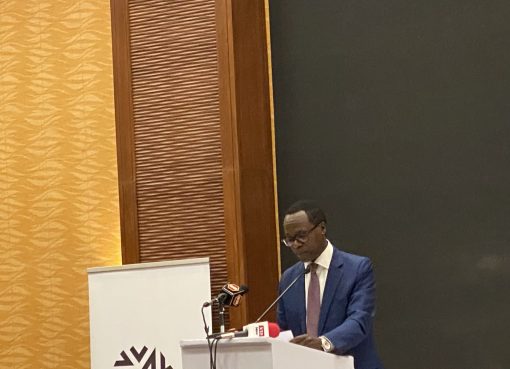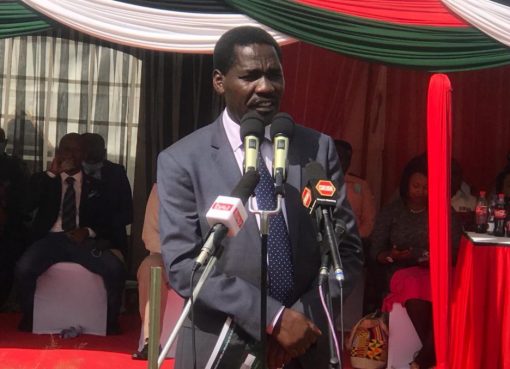The government has given a contractor working on the on Mulot-Sogoo- Tendewet -Sapet and Soggoo Olulung’a roads in Narok West a three month notice to complete a stalled bridge in Narok County.
Industrialization Principal Secretary Dr Francis Owino told Parbat Sayini Co. Ltd and Elite Earthmovers Ltd JV Construction Company that the Ngasiat Bridge has affected the transport system along the route thus endangering lives of the locals and their livestock.
He was addressing the residents of Mulot area in Ilmotiok ward of Narok West Sub County who slowed down the tour of the 62km road by the PS and his entourage demonstrating about the slow pace of ongoing construction of a bridge which has delayed for three years.
Owino was leading National Development Implementation Technical Committee (NDITC) by Principal Secretaries who were inspecting the 62 kilometre road in a project accompanied by the County Development Coordination and Implementation Committee led by his chair Mr. Evans Achoki who is the County Commissioner.
He was accompanied by Public Service PS Mary Kimonye, her University Education and Research counterpart Amb. Simon Nabukwesi and Ilmotiok MCA Samuel Kositany.
Dr Owino also directed the contractor, as part of temporary measures to ease free transport services along the road, to immediately repair the smaller bridge downstream which only needed filling for the residents to use it as Ngasiat bridge continues to be constructed.
“This road is important and is one of the legacy projects in which President Uhuru Kenyatta will leave to Kenyans and that’s why we are here to monitor these projects,” said Owino.
Nabukwesi said during Madaraka Day celebrations in Narok in 2019, the head of state had ordered the bridge to be completed.
The 62km road was launched in 2017 at a cost of nearly Sh. 2 billion and was supposed to have been completed by December 2020 and wananchi have been complaining about the delay.
The contractor told the PSs that the delay was occasioned by the delay in releasing funds and bad weather among other factors.
A boda boda rider Richard Kosgey said the bridge has turned into a nightmare forcing the road users not to reach home in time when the heavy rains pound the area because heavy rains overflow the temporary bridge.
A local youth leader Cornelius Taiywa said the police officers from the nearby Mulot Police Station have now turned the near the stalled bridge to be a roadblock where the boda boda riders are being harassed.
But Narok county commissioner Evans Achoki ordered the immediate removal of the roadblock.
The PSs also visited two schools in Narok, a primary and a secondary school to check on the observance of Covid -19 regulations and Narok Leather Factory and Tannery.
This project will be a game changer in the livelihood of the locals for having masses of animals which could turn into economic prospects having the necessary infrastructure in place.
The factory which is now operational will turn 4,000 tons of hides and skins annually and will also churn in a revenue of Sh.750million yearly and will create 300 jobs directly and a further 5,000 indirectly and help create wealth for the local communities.
The project which is funded by the government at a cost of Sh.700 million through Ewaso Ngiro South Development Authority (ENSDA) is already operational and awaiting commissioning by the President.
It’s strategically location to the world famous Maasai Mara, the factory will boost the economy of the region as it will produce leather goods, like leather jacket, shoes, bags and many others.
ENSDA will be partnering with Leather Development Council, Kenya Investment Authority, Export Processing Zone and Ethiopia who are the major competitor in the industry in Africa.
by Mabel Keya-Shikuku





